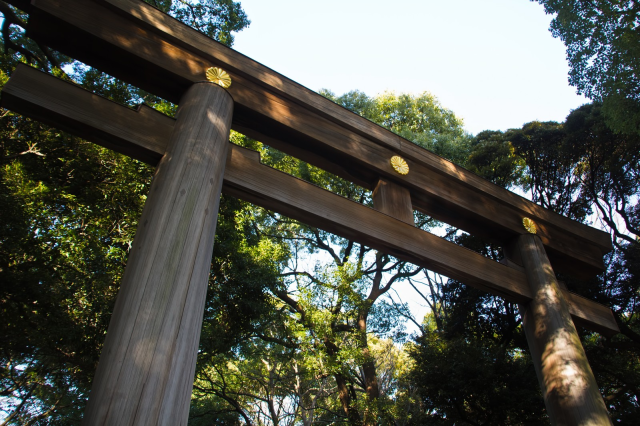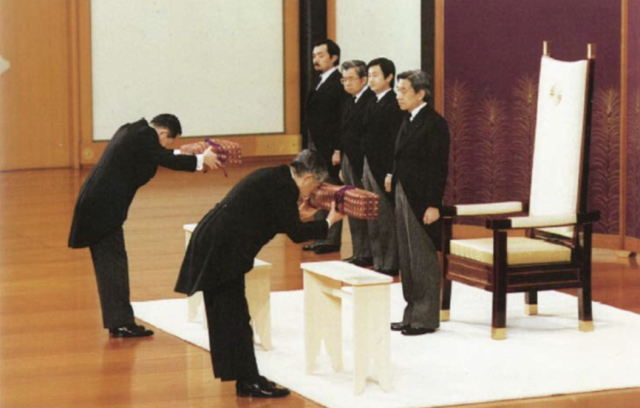
Spokesmen say this week’s ceremony, and another scheduled for October, violate the principal of separation of church and state.
On Tuesday afternoon, the abdication ceremony for Emperor Akihito was held at the Imperial Palace in Tokyo. At roughly the same time, though, a different gathering was taking place in the capital’s Shinjuku district, where a number of Japanese Christian organizations, including the Japan Baptist Convention, National Christian Council in Japan, and The Society of Jesus, held a joint press conference to voice their complaint about the ascension ceremony for Akihito’s son, Naruhito, which was scheduled to take place the next day.
At the heart of the Christian groups’ grievance is the fact that while the imperial changeover is an event of great cultural significance in Japan, there’s a religious aspect to it as well. Traditional Shinto belief holds that Japan’s emperors are the descendants of the sun goddess Amaterasu, the religion’s most important deity, and that by extension the emperor himself is a god in human form. In addition, Japan’s imperial regalia, called the Three Sacred Treasures and consisting of a sword, curved bead, and mirror, also have millennia-old connections to Shinto belief, and both the sword and bead are presented to the new emperor during the ascension ceremony.
▼ The sword and bead are presented, within wrappings, to Emperor Akihito during his ascension ceremony in 1989.
This prompted the assembled Christian groups to issue a joint statement declaring the ascension ceremony, an official state function which Prime Minister Shinzo Abe both attended and delivered a speech during, “a violation of the fundamental principles of democratic sovereignty, as well as the separation of government and religion, as specified in the constitution of Japan.” The organizations hold the same opinion about Emperor Naruhito’s enthronement ceremony, the second ceremony in the succession process, which is scheduled to take place in October, saying that the official state status of the ceremonies shows “a resurgence of State Shinto,” a term used to describe the strong reciprocal influences of Shinto doctrines, including the absolute divinity of the emperor, and government policies on each other during Japan’s bellicose political climate during the first half of the 20th century.
However, while Shinto fundamentalists do exist in Japan, it would be an exaggeration to say that the majority of the Japanese people revere the emperor as a god. Naruhito’s grandfather himself, Hirohito, famously made a public statement rejecting the idea that he was a living god following Japan’s surrender in World War II, and in the current era, the emperor is seen more as a symbol of Japan’s traditional values and culture, not as a religious leader.
Since the Emperor of Japan commands no official political power, it’s unlikely that the Japanese Christian groups’ claim that the ascension and enthronement ceremonies constitute a violation of the constitution will lead to any changes in the planned October event, just as Naruhito’s ascension ceremony went on as planned on May 1.
Source: Livedoor News/Asahi Shimbun Digital via Hachima Kiko
Top image: Pakutaso
Insert image: Wikipedia/RSSFSO
● Want to hear about SoraNews24’s latest articles as soon as they’re published? Follow us on Facebook and Twitter!


 Donald Trump will probably be the first foreign leader to meet with Japan’s new emperor
Donald Trump will probably be the first foreign leader to meet with Japan’s new emperor Japanese Emperor’s abdication date to be decided next month, expected later than initial reports
Japanese Emperor’s abdication date to be decided next month, expected later than initial reports Pokémon GO player claims his in-game snapshot shows Japan’s new emperor and Pikachu together
Pokémon GO player claims his in-game snapshot shows Japan’s new emperor and Pikachu together Japan issuing beautiful new coins to celebrate Emperor Naruhito’s enthronement
Japan issuing beautiful new coins to celebrate Emperor Naruhito’s enthronement J-Pop singer to perform song written and composed by the emperor and empress at upcoming ceremony
J-Pop singer to perform song written and composed by the emperor and empress at upcoming ceremony Foreigner’s request for help in Tokyo makes us sad for the state of society
Foreigner’s request for help in Tokyo makes us sad for the state of society Japanese city loses residents’ personal data, which was on paper being transported on a windy day
Japanese city loses residents’ personal data, which was on paper being transported on a windy day Should you add tartar sauce to Japanese curry rice? CoCo Ichi makes diners an unusual offer
Should you add tartar sauce to Japanese curry rice? CoCo Ichi makes diners an unusual offer Seaside scenery, history, and so many desserts on Yokohama’s Akai Kutsu【Japan Loop Buses】
Seaside scenery, history, and so many desserts on Yokohama’s Akai Kutsu【Japan Loop Buses】 Historical figures get manga makeovers from artists of Spy x Family, My Hero Academia and more
Historical figures get manga makeovers from artists of Spy x Family, My Hero Academia and more Red light district sushi restaurant in Tokyo shows us just how wrong we were about it
Red light district sushi restaurant in Tokyo shows us just how wrong we were about it 11 different ways to say “father” in Japanese
11 different ways to say “father” in Japanese McDonald’s new Happy Meals offer up cute and practical Sanrio lifestyle goods
McDonald’s new Happy Meals offer up cute and practical Sanrio lifestyle goods Akihabara pop-up shop sells goods made by Japanese prison inmates
Akihabara pop-up shop sells goods made by Japanese prison inmates French Fries Bread in Tokyo’s Shibuya becomes a hit on social media
French Fries Bread in Tokyo’s Shibuya becomes a hit on social media Japanese ramen restaurants under pressure from new yen banknotes
Japanese ramen restaurants under pressure from new yen banknotes Studio Ghibli releases new action figures featuring Nausicaä of the Valley of the Wind characters
Studio Ghibli releases new action figures featuring Nausicaä of the Valley of the Wind characters New private rooms on Tokaido Shinkansen change the way we travel from Tokyo to Kyoto
New private rooms on Tokaido Shinkansen change the way we travel from Tokyo to Kyoto Tokyo Tsukiji fish market site to be redeveloped with 50,000-seat stadium, hotel, shopping center
Tokyo Tsukiji fish market site to be redeveloped with 50,000-seat stadium, hotel, shopping center All-you-can-drink Starbucks and amazing views part of Tokyo’s new 170 meter-high sky lounge
All-you-can-drink Starbucks and amazing views part of Tokyo’s new 170 meter-high sky lounge Beautiful Ghibli sealing wax kits let you create accessories and elegant letter decorations【Pics】
Beautiful Ghibli sealing wax kits let you create accessories and elegant letter decorations【Pics】 Studio Ghibli releases Kiki’s Delivery Service chocolate cake pouches in Japan
Studio Ghibli releases Kiki’s Delivery Service chocolate cake pouches in Japan New definition of “Japanese whiskey” goes into effect to prevent fakes from fooling overseas buyers
New definition of “Japanese whiskey” goes into effect to prevent fakes from fooling overseas buyers Our Japanese reporter visits Costco in the U.S., finds super American and very Japanese things
Our Japanese reporter visits Costco in the U.S., finds super American and very Japanese things Studio Ghibli unveils Mother’s Day gift set that captures the love in My Neighbour Totoro
Studio Ghibli unveils Mother’s Day gift set that captures the love in My Neighbour Totoro More foreign tourists than ever before in history visited Japan last month
More foreign tourists than ever before in history visited Japan last month New Pokémon cakes let you eat your way through Pikachu and all the Eevee evolutions
New Pokémon cakes let you eat your way through Pikachu and all the Eevee evolutions Sales of Japan’s most convenient train ticket/shopping payment cards suspended indefinitely
Sales of Japan’s most convenient train ticket/shopping payment cards suspended indefinitely Sold-out Studio Ghibli desktop humidifiers are back so Totoro can help you through the dry season
Sold-out Studio Ghibli desktop humidifiers are back so Totoro can help you through the dry season Japanese government to make first change to romanization spelling rules since the 1950s
Japanese government to make first change to romanization spelling rules since the 1950s Ghibli founders Toshio Suzuki and Hayao Miyazaki contribute to Japanese whisky Totoro label design
Ghibli founders Toshio Suzuki and Hayao Miyazaki contribute to Japanese whisky Totoro label design Doraemon found buried at sea as scene from 1993 anime becomes real life【Photos】
Doraemon found buried at sea as scene from 1993 anime becomes real life【Photos】 Tokyo’s most famous Starbucks is closed
Tokyo’s most famous Starbucks is closed One Piece characters’ nationalities revealed, but fans have mixed opinions
One Piece characters’ nationalities revealed, but fans have mixed opinions We asked a Uniqlo employee what four things we should buy and their suggestions didn’t disappoint
We asked a Uniqlo employee what four things we should buy and their suggestions didn’t disappoint Princesses, fruits, and blacksmiths: Study reveals the 30 most unusual family names in Japan
Princesses, fruits, and blacksmiths: Study reveals the 30 most unusual family names in Japan Japanese Emperor abdication date revealed by government officials in new report
Japanese Emperor abdication date revealed by government officials in new report Emperor Akihito hints at abdication of throne in new video message
Emperor Akihito hints at abdication of throne in new video message Japan announces Kanji of the Year for 2019, and it was really the only logical choice
Japan announces Kanji of the Year for 2019, and it was really the only logical choice Confusion as Imperial official denies rumors that Japan’s Emperor Akihito plans to step down
Confusion as Imperial official denies rumors that Japan’s Emperor Akihito plans to step down Japanese Emperor’s abdication date set, end of Heisei era now officially on the horizon
Japanese Emperor’s abdication date set, end of Heisei era now officially on the horizon Police respond to explosion, suspected bombing at Yasukuni Shrine in central Tokyo
Police respond to explosion, suspected bombing at Yasukuni Shrine in central Tokyo Netizens educate president of Brazil on the wonders of the anime world with hilarious results
Netizens educate president of Brazil on the wonders of the anime world with hilarious results Happy 2,674 birthday, Japan! Now blow out all those candles!
Happy 2,674 birthday, Japan! Now blow out all those candles! The one-year countdown officially begins for the end of the Heisei Era
The one-year countdown officially begins for the end of the Heisei Era How do you say “Happy New Era” in Japanese?
How do you say “Happy New Era” in Japanese? Japan’s Princess Aiko won’t have tiara made for her, in consideration of hard economic times
Japan’s Princess Aiko won’t have tiara made for her, in consideration of hard economic times Emperors, anime icons, and porn stars show up in six-nation survey of most famous Japanese people
Emperors, anime icons, and porn stars show up in six-nation survey of most famous Japanese people Japanese government to outlaw carrying unbound knives on trains starting next year
Japanese government to outlaw carrying unbound knives on trains starting next year How to convert the Western calendar to Japanese Reiwa years
How to convert the Western calendar to Japanese Reiwa years
Leave a Reply